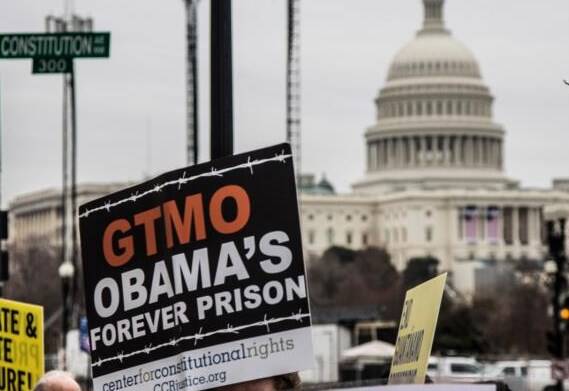For the first time in years, the Guantánamo prison is part of the national conversation. When President Barack Obama started his second term in January, the prison barely received a mention. But a massive hunger strike, started just two weeks later and now involving at least 100 of the 166 prisoners, has attracted wide public attention and concern. In a matter of days, an online petition to close the prison has received nearly 200,000 signatures.
As of today, 27 prisoners are being force-fed, a controversial practice regarded as unethical by the United Nations and American Medical Association, and four are hospitalized. In a New York Times op-ed on April 14, Samir Naji al Hasan Moqbel described the agonizing experience of having a feeding tube shoved up his nose, down his throat and into his stomach.
The White House has been closely following the situation, and at a press conference on April 30, marking the 100th day of the president’s second term, Barack Obama addressed the hunger strike and reaffirmed his commitment to closing the prison. “It is critical for us to understand that Guantánamo is not necessary to keep America safe,” Mr. Obama said, reciting his familiar list of reasons. “It is expensive. It is inefficient. It hurts us in terms of our international standing. It lessens cooperation with our allies on counterterrorism efforts. It is a recruitment tool for extremists. It needs to be closed.”
But, surprisingly, he didn’t stop there. Mr. Obama even seemed to criticize his own policy—first adopted by the Bush administration—of indefinitely detaining terrorism suspects without ever charging them in a military or civilian court. Mr. Obama said it was “not sustainable” that the United States would keep “in a no man’s land in perpetuity…a group of individuals who have not been tried.” He said this is “contrary to who we are, it is contrary to our interests, and it needs to stop.”
Mr. Obama predictably blamed Congress for the current state of affairs, and he promised to “re-engage with Congress” to find a solution.
My advice: Mr. Obama should not waste his time with Congress.
Since most Americans favor keeping the prison open, the issue is a political liability for most members of Congress. If Mr. Obama is sincere in his commitment to close the prison, he needs to take responsibility for making it happen.
This is how, within the law, the president can close the prison:
- Declare an end to “active hostilities” in the war on terror, which would require the government to charge detainees with war crimes or arrange their immediate release. (I wrote about this in January.)
- Appoint a high-level official to oversee the prison’s closure.
- Reject a proposal to spend nearly $200 million to update the facilities and build a new prison. It already costs U.S. taxpayers nearly $1 million to house each inmate each year at Guantánamo, the “most expensive prison on earth.”
- Lift the ban on repatriating the 56 Yemeni detainees. Senator Dianne Feinstein, Democrat of California, has urged President Obama to consider this option.
- Work with the Secretary of Defense to obtain national security waivers to transfer or release the 86 detainees cleared by the president’s own task force.
- Stop appealing successful habeas petitions. If a district judge orders the release of a prisoner, allow the decision to stand. National security waivers are not required when a prisoner has court-ordered release papers.
- Scrap the military commissions system, which lacks legitimacy and results—it has yielded only seven convictions in 11 years, and two were recently vacated by a federal court of appeals.
- Begin charging detainees in the federal courts, a pathway Mr. Obama defended in the press conference on April 30 as “consistent with our Constitution, consistent with due process, consistent with the rule of law, consistent with our traditions.” If detainees cannot be transferred to United States for trial, then the federal trials should be convened in Guantánamo Bay.
Mr. Obama should not blame Congress for this situation, nor should he rely on Congress to fix the problem. He cannot wait any longer. The situation has reached a crisis point. Lives hang in the balance; the longtime Muslim adviser at the prison recently predicted that the hunger strike will lead to deaths.
Mr. Obama has boldly reasserted his principles. Now he must spend whatever political capital is necessary to deliver an immediate remedy to a situation that, in the president’s own words, is “not sustainable” and “contrary to who we are.”
Click here for America's complete coverage of the Guantánamo prison.








